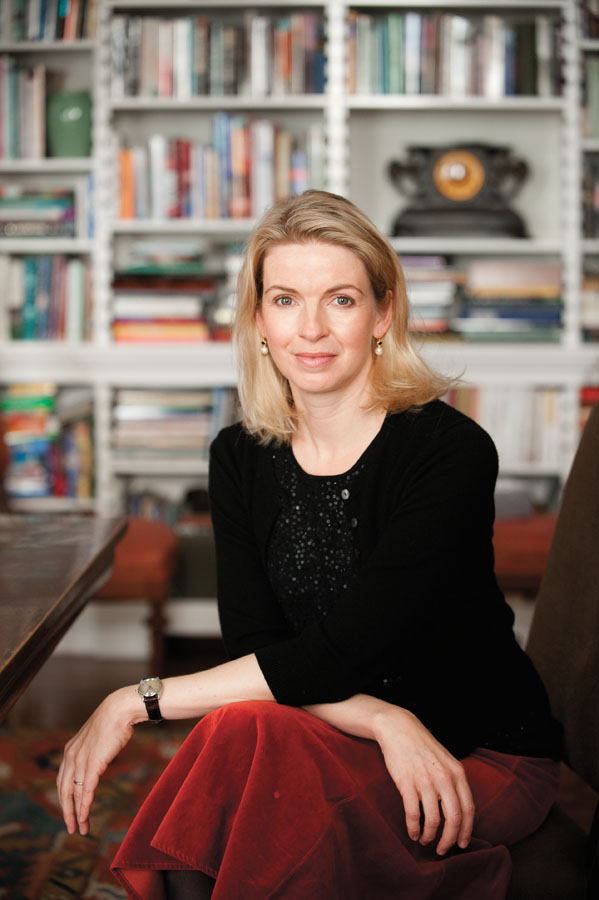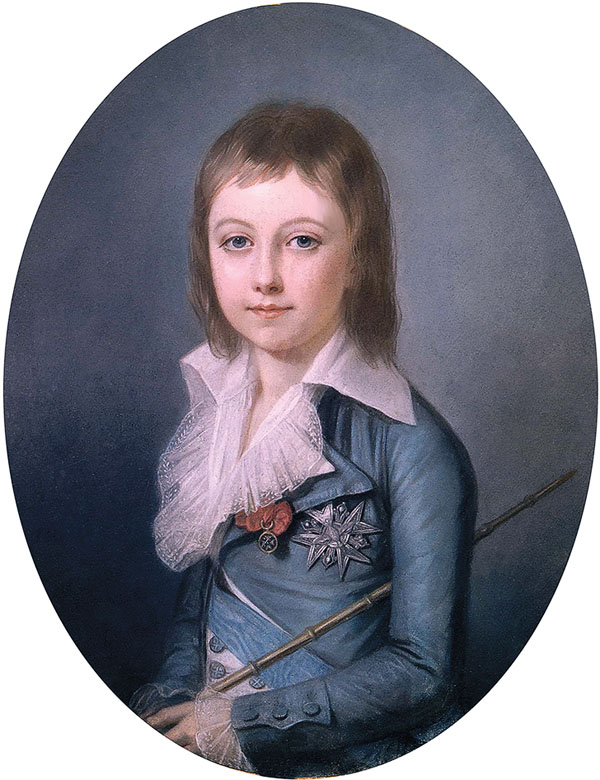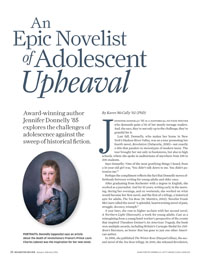Features
 PORTRAITS: Donnelly (opposite) says an article about the death of revolutionary France’s Prince Louis Charles (above) was the inspiration for her new novel. (Photo: Adam Fenster)
PORTRAITS: Donnelly (opposite) says an article about the death of revolutionary France’s Prince Louis Charles (above) was the inspiration for her new novel. (Photo: Adam Fenster)Jennifer Donnelly ’85 is a historical fiction writer who demands quite a bit of her mostly teenage readers. And, she says, they’re not only up to the challenge, they’re grateful for it.
Last fall, Donnelly, who makes her home in New York’s Hudson River Valley, was on a tour promoting her fourth novel, Revolution (Delacorte, 2010)—not exactly a title that panders to stereotypes of modern teens. The tour brought her not only to bookstores, but also to high schools, where she spoke in auditoriums of anywhere from 100 to 300 students.
Says Donnelly: “One of the most gratifying things I heard, from a 16-year-old girl was, ‘You didn’t talk down to me. You didn’t patronize me.’”
Perhaps the compliment reflects the fact that Donnelly moves effortlessly between writing for young adults and older ones. After graduating from Rochester with a degree in English, she worked as a journalist. And for 10 years, writing early in the morning, during her evenings, and on weekends, she worked on what would become her first novel, and the first of a trilogy, a historical epic for adults, The Tea Rose (St. Martin’s, 2002).
 (Photo: Getty Images)
(Photo: Getty Images)Novelist Frank McCourt called the novel “a splendid, heartwarming novel of pain, struggle, decency, triumph.” A year later, she rose to higher acclaim with her second novel, A Northern Light (Harcourt), a work for young adults. Cast as a reimagining from a young hotel worker’s perspective of the events that inspired Theodore Dreiser’s An American Tragedy, the book won multiple awards, including Britain’s Carnegie Medal for children’s literature, an honor that has gone to just one other American author.
In 2006, she published The Winter Rose (HarperCollins), the second novel of the Tea Rose trilogy. In 2010, she released Revolution, and the third and final work in the Tea Rose trilogy, The Wild Rose, is slated for release by Hyperion later in 2011.
Donnelly argues the distinction between adult and young adult fiction is limiting. “People look for an easy categorization,” she says. “Maybe it’s just not there.”
Her young adult novels are narrated by characters in their teens, but that doesn’t mean that only teens should find them interesting, Donnelly says. “I think a good story with a compelling character that’s well written should appeal to anybody.”
That said, she doesn’t mind at all being called a young adult novelist. “I think young adult writers, some of them at least, are the ones who are taking the biggest risks right now,” she adds, naming two of her favorites, M. T. Anderson and Meg Rosoff. “People like this are brilliant writers. They just so happen to write for young adults.”
Revolution, released in October, is, like all Donnelly’s novels, grounded in copious research. Narrated by a modern teen—17-year-old Andi Alpers, a precocious Brooklyn prep schooler full of angst, despair, passion, and bonded inseparably with her guitar—it asks young readers to delve into much that’s likely to be unfamiliar. The novel explores political and social revolution in a distant country more than two centuries ago. And a key aspect of Andi’s character is her less contemporary musical interests—from the fictional 18th-century French composer Amadé Malherbeau to popular musical groups such as Pink Floyd and the Smiths, bands from the 1970s and 1980s that are likely to be more familiar to older adults than to younger readers.
Donnelly worries little that a dense historical subplot, or cultural references that were most resonant two or three decades ago, will alienate her younger readers. In the first place, she says, “It’s not going to capture everybody. That’s not my intention.” Second, Donnelly believes that the emotional power of her books is what ultimately engages her readers, no matter who the characters are, or in what nation or century they lived. “Emotion is the most important thing. That’s how I connect with my readers,” she says. “If that emotion is not there, I actually feel that as a writer I’ve failed.”
Sara Gundell, the founder of Novel Novice, an organization that reviews young adult fiction and creates learning materials to accompany new releases, concedes that she initially decided to feature Revolution “because it so clearly offered us a lot of opportunities to tie in history lessons.” After reading the book, however, she was struck even more by its emotional power. “I was absolutely blown away by the book in its entirety,” she says. “What makes Revolution stand out as a work of young adult fiction is that it excels at both challenging and then rewarding its readers.”
Revolution begins as Andi, crushed by the death of her little brother, Truman, her mother’s subsequent descent into a deep and debilitating depression, and by her cool relationship with her emotionally remote, work-driven father, accompanies her father on a trip to Paris during her winter break. Concerned about Andi’s mediocre performance in school, her father insists she travel with him where she’s to spend her days in the library, working on her senior thesis on Malherbeau.
She makes an intriguing discovery, however, that occupies her at least as much as her thesis: the diary of a young woman living during the French Revolution, a street performer hired by Marie Antoinette to be a companion to her son, Prince Louis Charles.
The parallels between Andi and the 18th-century Frenchwoman are striking. “Their names are anagrams,” says Donnelly of Andi, whose full name is Diandra Xenia Alpers, and the Frenchwoman, Alexandrine Paradis. Above all, both are heartbroken by loss—of Truman, and of Louis Charles, two young boys who share many personal characteristics, as well as tragic fates.
Alternating between Andi’s narration, and the long passages from Alexandrine’s diary, Donnelly creates a novel within a novel. Her initial inspiration for Revolution came from an article she read in the New York Times in 1999 reporting on an apparent resolution to a two-century debate over the fate of Louis Charles after his parents, King Louis XVI and Marie Antoinette, were guillotined at the height of the French Revolution. The prince, then eight years old, was imprisoned alone in a dark tower. He died there, and a physician who performed an autopsy on the boy snatched his heart. Miraculously, the organ was kept intact for more than two centuries as it was passed from king to archbishop to descendants of the physician. But over the centuries, several claims were made that supporters of the royal family had rescued Louis Charles and left an imposter in the tower in his place.
In 1999, advanced DNA technology answered the question of whether the heart saved during the autopsy in 1795 was indeed that of Louis Charles. (According to the test, it was.)
 COLDPLAY: Donnelly, walking with her greyhound, Scotty, mixes contemporary pop culture with historic political struggles in
Revolution. (Photo: Adam Fenster)
COLDPLAY: Donnelly, walking with her greyhound, Scotty, mixes contemporary pop culture with historic political struggles in
Revolution. (Photo: Adam Fenster)What impressed Donnelly about the story wasn’t the intrigue, but the tragedy of the young boy’s slow, painful, and lonely death. She saved the article, and in 2003, after she gave birth to a daughter, she thought again about the story.
“The point that was crushing me at the time, was that this violent and brutal world of ours doesn’t change,” she says. “Terrible things were going on 200 years ago, terrible things are going on now. A lot of those terrible things involve children. How do we live in this world?”
Writing was her way of working through that perennial question. And the person who helped her to do it was Andi Alpers.
“This sounds so nutty, but these characters do just sort of walk out of the mists of the imagination,” Donnelly says. Ensconced in a café in Brooklyn while her daughter was in preschool, steeped in reading about the French Revolution as she plotted the novel, Donnelly took in her surroundings. All around her, on the streets, and in and out of the café, were the students from the nearby elite private schools, St. Ann’s School and Packer Collegiate Institute.
“As I was watching them, observing them, listening to them, it suddenly dawned on me that what was lacking in this story was a present point of view, and that would give me such a wonderful way to draw parallels between past and present” in drawing out the enduring nature of evil and cruelty, she says. “That’s where Andi came from.”
Donnelly also poured a few of her own experiences into Andi. As a young adult, Donnelly says she, too, struggled with depression and a heightened sensitivity to the cruel and tragic elements of the human experience. But also like Andi, she had her art.
Looking back at what it took to get her first novel published, Donnelly refers to her “many, many years of struggle.” At Rochester, she was not always confident in her writing. She admits, for example, that she was too intimidated to take a course with the poet Anthony Hecht—“he cut an imposing figure in Morey Hall,” she later wrote. The next time she saw him was in 2004, as a peer, at the Los Angeles Times Festival of Books, where they were both receiving prizes for their work.
Donnelly says that when she finally got an agent to help her sell her manuscript for The Tea Rose, “he said, ‘You can write. But you need a lot of work still on things like plot and structure and narrative drive.’”
She worked on the manuscript for two more years. “Even then,” she says, “I got tons of rejections. Pretty much every publishing house in New York slammed the door in our faces. We had to put the manuscript aside and go out again in six months after there had been a bit of movement among the publishing houses.”
In Andi’s case, Donnelly says, “Music sustains her. It’s about the only thing she’s got.” And like Donnelly, who says she was sustained through periods of despair by the legacy of writers who’ve come before—from James Joyce, William Faulkner, Jane Austen, and other long-gone writers she read—“Andi understands as an artist that this legacy exists. She can reach back and clasp hands with her artistic ancestors. And what I want to suggest to teenagers is, ‘reach back, clasp hands with your artistic ancestors. Hold their hands, let them carry you if you’re struggling, and they will sustain you.’”
Donnelly gives both Alex and Andi the final word in Revolution, and from Donnelly’s standpoint, it’s the crux of the book. Drawing from the last line in Alex’s diary, Andi repeats ‘the world goes on, stupid and brutal, but I do not.’ Finally, says Donnelly, “she understands what Alex is trying to tell her. And maybe that’s enough for Andi to get off her suicidal path and to positively impact a few lives around her.”
Donnelly says she doesn’t like to be “preachy and messagey.” Nonetheless, she believes Andi’s realization may give solace to young adults. And perhaps older ones too.

